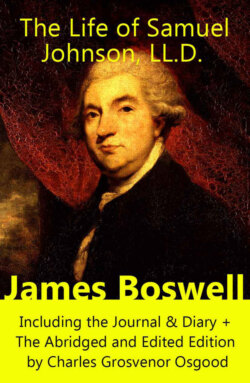Читать книгу The Life of Samuel Johnson, LL.D. - James Boswell - Страница 140
На сайте Литреса книга снята с продажи.
‘MADAM,
Оглавление‘I hope you will believe that my delay in answering your letter could proceed only from my unwillingness to destroy any hope that you had formed. Hope is itself a species of happiness, and, perhaps, the chief happiness which this world affords[1091]: but, like all other pleasures immoderately enjoyed, the excesses of hope must be expiated by pain; and expectations improperly indulged, must end in disappointment. If it be asked, what is the improper expectation which it is dangerous to indulge, experience will quickly answer, that it is such expectation as is dictated not by reason, but by desire; expectation raised, not by the common occurrences of life, but by the wants of the expectant; an expectation that requires the common course of things to be changed, and the general rules of action to be broken.
[Page 369: Johnson’s second letter to Baretti. Ætat 53.]
‘When you made your request to me, you should have considered, Madam, what you were asking. You ask me to solicit a great man, to whom I never spoke, for a young person whom I had never seen, upon a supposition which I had no means of knowing to be true. There is no reason why, amongst all the great, I should chuse to supplicate the Archbishop, nor why, among all the possible objects of his bounty, the Archbishop should chuse your son. I know, Madam, how unwillingly conviction is admitted, when interest opposes it; but surely, Madam, you must allow, that there is no reason why that should be done by me, which every other man may do with equal reason, and which, indeed, no man can do properly, without some very particular relation both to the Archbishop and to you. If I could help you in this exigence by any proper means, it would give me pleasure; but this proposal is so very remote from all usual methods, that I cannot comply with it, but at the risk of such answer and suspicions as I believe you do not wish me to undergo.
‘I have seen your son this morning; he seems a pretty youth, and will, perhaps, find some better friend than I can procure him; but, though he should at last miss the University, he may still be wise, useful, and happy. I am, Madam,
‘Your most humble servant,
